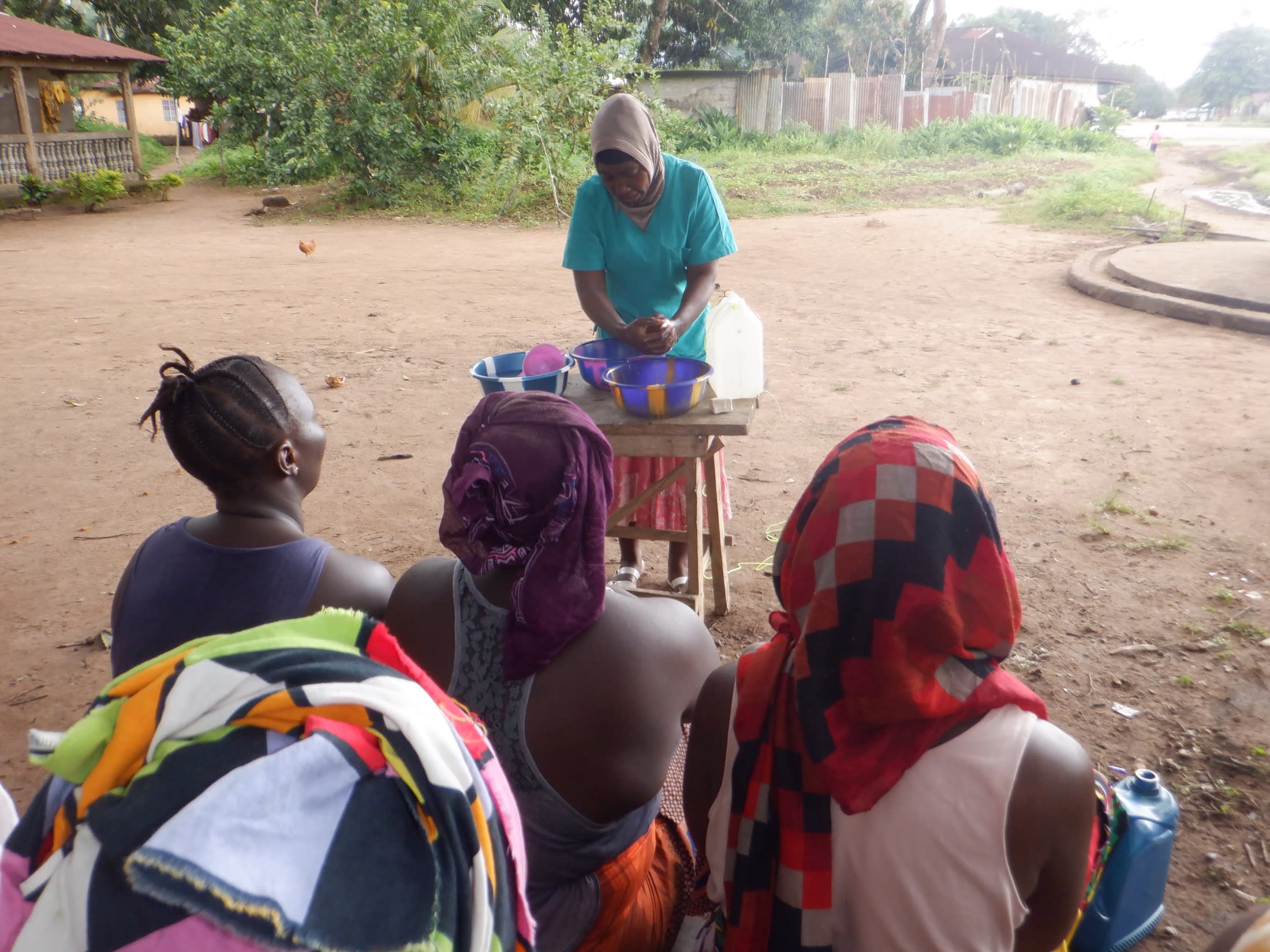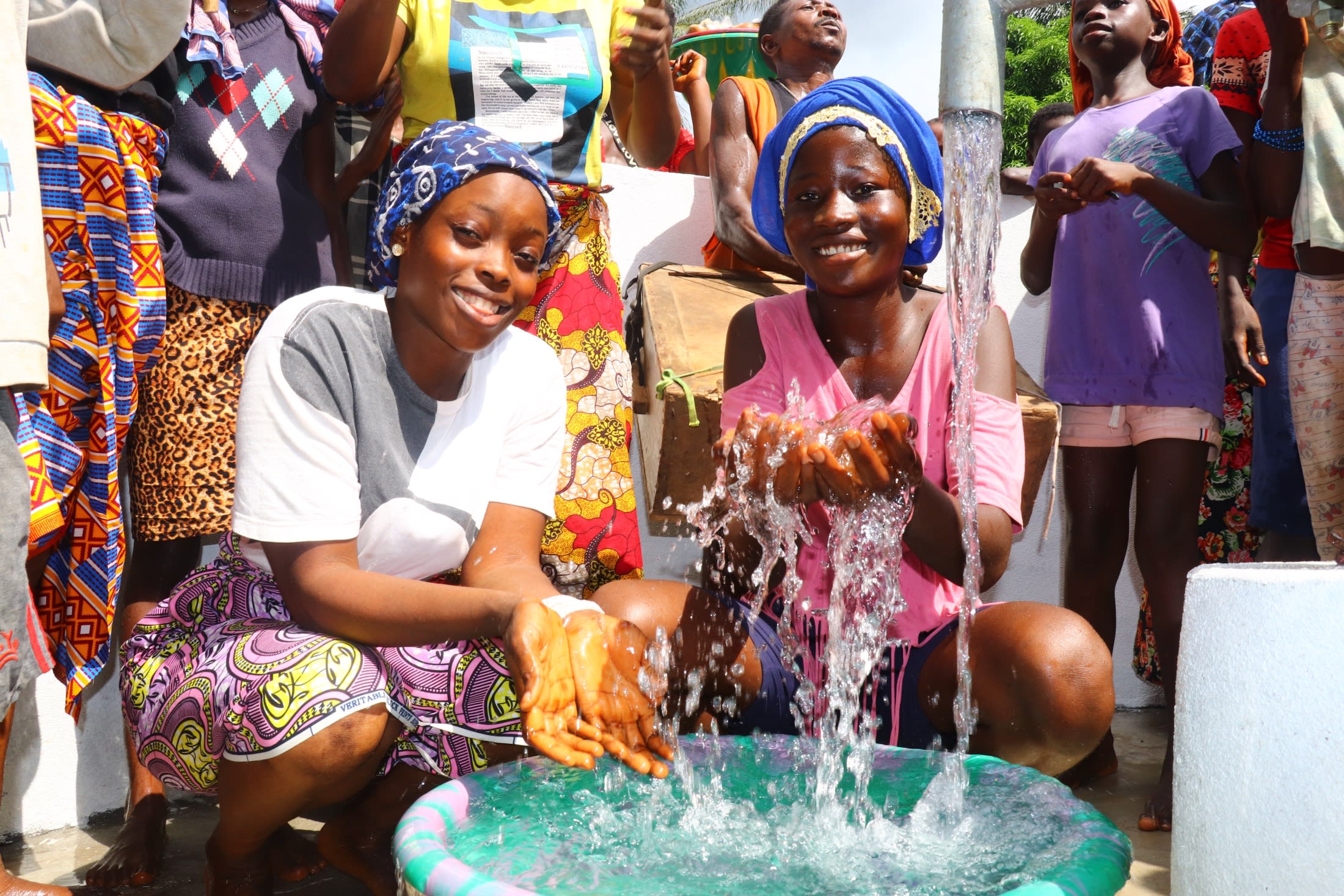17-year-old Emma B. is greatly affected by the lack of clean water sources available in her community. She is not alone since 143 other people are living in her community of Komrabai who all need a clean water solution.
"I find it very difficult to fetch water for my parents, especially in the morning hours. For me to fetch water, I must walk a far distance to the stream water source. Fetching water from this source is hard because the hill is difficult to climb. This situation really affects me, especially when I want to go to school," said Emma, shown below collecting swamp water.

Even though Emma finds it challenging to make it to the stream (swamp) even once, she inevitably ends up having to return several times a day to meet her family's needs. Her only alternative is to visit a hand-dug well in a neighboring community, but that is a risky endeavor.
"There are times I would go to the alternate source to fetch water. The thing that [makes] me more terrified is the crossing of the highway to the water point. This is very risky because trucks, vehicles, and motorbikes pass at a high speed on the highway," said Emma.
The well is also so overcrowded she wastes even more time than it would take at the swamp.
"Another challenge I face is that it is difficult for me to fetch water on time from this source," Emma said.
Whenever Emma gets to the water point, there is already a line of containers reserving spots for community members, sometimes placed there even before the well opens. She cannot cut the line, so she has no choice but to wait, which often makes her late to school or unable to collect sufficient water to meet her family's needs.
45-year-old Fatmata Bangura faces similar challenges to Emma when she tries to collect enough water to take care of her household responsibilities and still get to the market on time to make her living as a trader.

"The water situation in this community is really affecting [me] because we do not have any wells in our community," said Fatmata. "Ever since I migrated to this community, I have been fetching water from the stream. Fetching water from this source is very challenging for me due to the walking distance and the dangerous road to walk to the water source. One would take more than half an hour to do a single trip. I normally do six trips [in] a day, three in the morning and three in the evening."
Fatmata continued: "Most times, I would still manage to fetch the water and then sieve it with [a] white cloth for the dirt not to pass through. There are times the water would still be dirty even after sieving [it] unless I wait for [the] sediment to [settle]. This waiting time affects me, especially when I want to cook."
When Fatmata knows she doesn't have time to wait, she is brave and takes the risk of crossing the busy road to the hand-dug well.
"There are times I would not be able to sieve the water, so I would end up going to the well that is over the street to fetch water for drinking and cooking," Fatmata said. "Fetching water from this source is equally challenging because of the highway. I could hardly cross the highway with [a] bucket of water on my head because of the frequent passing of vehicles. Most times, I would put the container on the ground since I would be tired of waiting for the vehicles to pass."
"Increased water collection time reduces the amount of water that a household uses per day, effectively reducing the amount of clean water available for drinking, cooking and hygiene practices." - Science Direct
Not only is it risky for Fatmata and her fellow community members to get to the water point across the road, but as Emma mentioned earlier, she also faces the challenge of the water source being overcrowded.
"Another challenge I face is that the water source is mainly congested with people. This situation affects me, especially when I want to sell. I would spend [a] long time waiting at the water point whilst customers would be asking for me at home. This situation makes [me] lose customers because at the time they want to buy cooking condiments from me, I would not be at home," said Fatmata.
With so much energy spent getting to water sources and so much time wasted waiting to collect water, it is a challenge in Komrabai to take care of essential tasks. Community members do their best, yet without time and water inevitably some chores go undone. Worse, some people needlessly suffer from water-related illnesses that only compound their challenges.
By putting a well in the community that provides clean, safe water, there is hope that people's health will improve, and water access will be much quicker and less labor-intensive so community members can complete the daily tasks that are important to them.

"I would be glad if we could get a new water point. All the water constraints I am presently undergoing would become history," Fatmata concluded.
What We Can Do:
New Well
Where we will be drilling is centrally located and will relieve many people of the long journey to fetch water and the challenge of accessing clean water.
Our team will drive over the LS200 mud rotary drill rig and set up camp for a couple of nights. Once the well is drilled to a sufficient water column, it will be cased, developed, and then tested. If these tests are positive, our mechanics will install a new India Mark II pump.
Once we drill this borehole, the surrounding community will be provided with plenty of accessible, clean drinking water.
Training
There will be hygiene and sanitation training sessions offered for three days in a row.
Community members will learn how to make a hands-free handwashing station called the "tippy-tap." We will use these tippy taps for handwashing demonstrations and will also teach about other tools like dish racks and the importance of properly penning in animals. We will highlight the need to keep restrooms clean, among many other topics.
This training will also strengthen a water user committee that will manage and maintain this new well. They will enforce proper behavior and report to us whenever they need our help in solving a serious problem, like a pump breakdown.






 Borehole Well and Hand Pump
Borehole Well and Hand Pump
 Rehabilitation Project
Rehabilitation Project

























